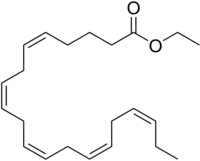Ethyl eicosapentaenoic acid
 |
|
| Names | |
|---|---|
|
IUPAC name
Ethyl (5Z,8Z,11Z,14Z,17Z)-eicosa-5,8,11,14,17-pentaenoate
|
|
| Other names
Eicosapentaenoic acid ethyl ester; Ethyl eicosapentaenoate; Eicosapent; Icosapent ethyl; EPA ethyl ester; E-EPA
|
|
| Identifiers | |
|
86227-47-6 |
|
| 3D model (Jmol) | Interactive image |
| ChEBI |
CHEBI:84883 |
| ChemSpider |
8007147 |
| 7441 | |
| PubChem | 9831415 |
|
|
|
|
| Properties | |
| C22H34O2 | |
| Molar mass | 330.51 g·mol−1 |
|
Except where otherwise noted, data are given for materials in their standard state (at 25 °C [77 °F], 100 kPa).
|
|
|
|
|
| Infobox references | |
Ethyl eicosapentaenoic acid (E-EPA, icosapent ethyl) is a derivative of the omega-3 fatty acid eicosapentaenoic acid (EPA) that is used in combination with changes in diet to lower triglyceride levels in adults with severe (≥ 500 mg/dL) hypertriglyceridemia. This was the second class of fish oil-based drug to be approved for use as a drug and was approved by the FDA in 2012. These fish oil drugs are similar to fish oil dietary supplements but the ingredients are better controlled and have been tested in clinical trials.
The company that developed this drug, Amarin Corporation, challenged the FDA's ability to limit its ability to market the drug for off-label use and won its case on appeal in 2012, changing the way the FDA regulates pharmaceutical marketing.
E-EPA is used in addition to changes in diet to reduce triglyceride levels in adults with severe (≥ 500 mg/dL) hypertriglyceridemia.
Intake of large doses (2.0 to 4.0 g/day) of long-chain omega-3 fatty acids as prescription drugs or dietary supplements are generally required to achieve significant (> 15%) lowering of triglycerides, and at those doses the effects can be significant (from 20% to 35% and even up to 45% in individuals with levels greater that 500 mg/dL). It appears that both eicosapentaenoic acid (EPA) and docosahexaenoic acid (DHA) lower triglycerides, but DHA appears to raise LDL-C ("bad cholesterol") more than EPA, while DHA raises HDL-C ("good cholesterol") while EPA does not.
There are other omega-3 fish oil based drugs on the market that have similar uses and mechanisms of action.
There are many fish oil dietary supplements on the market. There appears to be little difference between in effect between dietary supplement and prescription forms of omega-3 fatty acids but EPA and DHA ethyl esters (prescription forms) work less well when taken on an empty stomach or with a low-fat meal. The ingredients of dietary supplements are not as carefully controlled as prescription products and have not been fixed and tested in clinical trials, as prescription drugs have, and the prescription forms are more concentrated, requiring fewer capsules to be taken and increasing the likelihood of compliance.
...
Wikipedia
